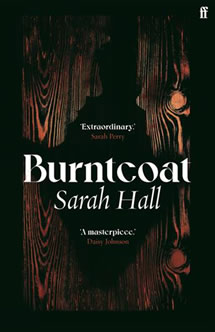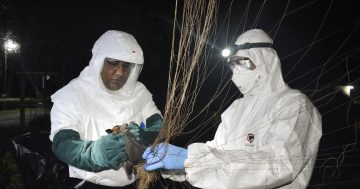Reviewed by Robert Goodman.
By Sarah Hall, Allen and Unwin, $34.99.
 Everyone is doing it at the moment so it is no surprise that multi award winning and Booker shortlisted author Sarah Hall’s new novel involves a pandemic. And again, in line with many of the other current pandemic novels, she does this by imagining something worse than Covid-19 and its many variants. But in the hands of a novelist like Hall, there is of course much more to Burntcoat than a pure pandemic novel.
Everyone is doing it at the moment so it is no surprise that multi award winning and Booker shortlisted author Sarah Hall’s new novel involves a pandemic. And again, in line with many of the other current pandemic novels, she does this by imagining something worse than Covid-19 and its many variants. But in the hands of a novelist like Hall, there is of course much more to Burntcoat than a pure pandemic novel.
Edith is an award winning artist who specialises in a form of sculpture using timber that is burnt black on the outside, an ancient Japanese method that protects the wood underneath. She lives in a converted warehouse on the river and when the book opens is succumbing to a recurrence of a deadly virus that swept through Britain many years before. Burntcoat is the story of Edith’s life focusing on the intense relationship that she formed with a man called Halit just before and during the first, deadly wave of the epidemic, known as Nova.
Hall draws a complex and compassionate picture of Edith. Over the length of the book, in carefully meted out flashbacks Hall tells the story of Edith who as a girl she chose to stay with her mother who was recovering from brain damage caused by a tumour. It charts her growth as an artist, her response to becoming famous and a disastrous relationship. All of this is juxtaposed with the sensuous (Hall revels in the physical) and quickly deep relationship she forms with Halit as they are forced to live together by lockdown restrictions and then the unfolding tragedy as the virus takes hold.
It is interesting to see how the coronavirus is colonising and informing literature. Burntcoat is not about the current pandemic but all of the aspects that we now are familiar with – the hoarding, the lockdowns, the overburdening of the health system – are referenced i and are not much different to things readers will have experienced. Given this – while the virus is used as a driver of the relationship between Edith and Halit, it is unclear why Hall needed to invent a new, worse virus to plague the world with.
The Nova pandemic is really the least interesting part of this novel and, if anything the aspect that is likely to put off readers in the “too soon” category. Much more satisfying is the economical and insightful way in which Hall tells Edith’s story and that story itself, which itself is one of resilience and growth. The form of Edith’s art is a very overt metaphor for her life, a metaphor that Hall does not shy away from or hide, expressing it directly in the final paragraph for those who might have missed it. But it is used a moment of self-realisation and in that way Hall makes it work.
Over 750 more reviews can be found on Pile by the Bed.











